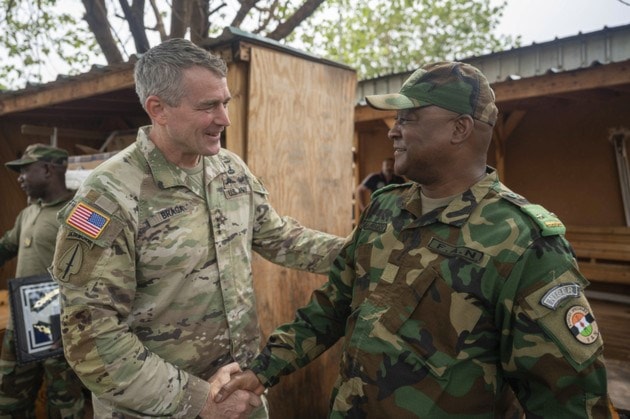US downplays effect of severed military accords with Niger
While some experts expressed the seriousness of the ending of the military accords between Niger and the US, others stated it does not necessarily entail the withdrawal of US troops.
-

US Army Lt. Gen. Jonathan Braga meets with Maj. Gen. Moussa Barmou at Air Base 101, Niger on June 12, 2023. (US Air Force)
Last Saturday, Niger declared an abrupt end to a longstanding military agreement with the United States in a fiery public address by the spokesperson of the Nigerien military.
The accord, which facilitated the "illegal" presence of US military personnel and civilian staff from the Department of Defense within the Nigerien borders, was severed by Niger as being unfair and a tool used by the US to undermine the nation's sovereignty.
Since then, US officials downplayed the magnitude of Niger's action and tried to promote a toned-down narrative that does not reflect badly on the United States.
Celeste A. Wallander, an assistant secretary of defense, told lawmakers at the House Armed Services Committee on Thursday that Niger's decision was not as severe as initially thought, and that the US was trying to find a loophole to keep its troops in the African nation, the New York Times reported.
“The self-identified government of Niger has not asked or demanded that the United States military depart. There is actually quite a mixed message. We are following up and seeking clarification,” she said, adding that only the military accord was discarded.
However, ongoing discussions between the transitional government in Niger and the United States have examined the withdrawal of US troops from the African nation's grounds and the steps that would follow, State Department deputy spokesperson Vedant Patel said on Monday.
When asked about the possibility of concluding US soldiers' presence in Niger, Patel replied, "This is one of the things that we continue to be discussing with them [CNSP] and discussing next steps."
If the US is ousted from Niger, more bases to be built in Africa
Before Niger decided to sever the joint military accord with the US, an American delegation, including Wallander, headed to the country to discuss several security concerns such as developing relations between Niger and Russia, negotiations regarding Iran's access to Nigerien uranium reserves, and the post-coup plans that did not have a clear sense of democratic direction.
The meeting was described as tense, with Niger saying the US delegation had a condescending attitude and attempted to dictate Niger's partnerships during the discussions. Niger then broke the accords.
However, US and Western analysts claim it is unclear whether Niger intends to remove US troops from the country instead of using the pronouncement as leverage in negotiations to attain more US support and benefits.
In this context, Wallander said, “Countries that are run by military juntas are not reliable security partners," adding that “part of the value proposition for us having access in Niger would be a return to democratic civilian rule in Niger.”
As US troops find themselves inactive in Niger, the US has been contemplating the deployment of other military drone bases in several other African nations. Regardless, the situation in Niger could reflect badly on the US if the African country does actually remove the foreign troops from its lands.
“I’m concerned that the end of any US assistance to Niger not only opens the door for Russia and the rebranded Wagner forces operating under the banner of Africa Corps, but also exacerbates the counterterrorism challenge at a time when Al Qaeda and Islamic State affiliates have grown into a formidable regional threat," said Colin P. Clarke, a counterterrorism analyst at the Soufan Group, a New York-based security consulting firm.
Consequently, Clarke said that JNIM, the Qaeda affiliate, has significantly expanded in Sahel.
Read more: US contemplating physical elimination of junta leaders: Russia's SVR

 4 Min Read
4 Min Read








